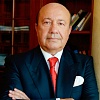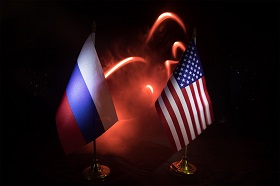On November 3, the U.S. presidential elections are to take place. Both the USA and the world will be closely monitoring the event. Whatever some may say about “the decline of the U.S.,” America remains the leading global power whose policies and politics largely or sometimes decisively determine international security, the global economy and the state of affairs in many other areas vital for humanity as a whole.
As usually happens in such circumstances, numerous experts, analysts and political clairvoyants are attempting to predict who will win the November elections. Who will be governing America from the Oval Office in the White House for the next four years? Is it going to be Republican incumbent Donald Trump or Democratic challenger, former Vice President Joe Biden? Even today, when the campaign is in the homestretch, few are ready to name the winner confidently.
Discussions on the subject are going on at full throttle in Russia too. Naturally, this is not because Russia wants to influence the outcome of the elections somehow. Such fantasies could only be produced by a fevered imagination. Even so, Russia understands that, in one way or another, it will need to have dealings with the U.S. not just on some minor issues but on an entire range of key problems in Russia's foreign and even domestic policy.
Does this mean that a Biden victory would benefit Russia? Not necessarily. America’s political divide and, broadly speaking, its social divide will not be overcome in November and Trump’s supporters will hardly be ready to surrender unconditionally. The bitter political struggle in the U.S. will continue no matter what the outcome of the elections. Consequently, it is difficult to hope for any radical shifts in bilateral Russia-U.S. relations. As far as one can tell, Joe Biden has neither the political will not the requisite political capital to promote such shifts.
At the same time, given Biden’s heavy “dependence” on the Democratic party machine, we can expect his Russia policy to be more predictable. In other words, alongside a hard line on many global political issues, we cannot rule out a balanced policy on some strategic stability matters, primarily arms control.
Regardless of which party will control the White House and dominate Capitol Hill, Russia needs to be ready for its relations with the U.S. to remain largely confrontational and adversarial and only slightly based on mutually advantageous cooperation. Consequently, for the next four years, the tasks for Russia’s U.S.-related diplomacy will largely come down to mitigating the risks and costs entailed by such confrontation and rivalry. In order to handle this seemingly modest task, Moscow will need absolute concentration, attention and flexibility. The stakes in the game are too high to fall for provocations and allow emotions to have an adverse effect on strategic interests.
On November 3, the U.S. presidential elections are to take place. Both the USA and the world will be closely monitoring the event. Whatever some may say about “the decline of the U.S.,” America remains the leading global power whose policies and politics largely or sometimes decisively determine international security, the global economy and the state of affairs in many other areas vital for humanity as a whole.
As usually happens in such circumstances, numerous experts, analysts and political clairvoyants are attempting to predict who will win the November elections. Who will be governing America from the Oval Office in the White House for the next four years? Is it going to be Republican incumbent Donald Trump or Democratic challenger, former Vice President Joe Biden? Even today, when the campaign is in the homestretch, few are ready to name the winner confidently.
Discussions on the subject are going on at full throttle in Russia too. Naturally, this is not because Russia wants to influence the outcome of the elections somehow. Such fantasies could only be produced by a fevered imagination. Even so, Russia understands that, in one way or another, it will need to have dealings with the U.S. not just on some minor issues but on an entire range of key problems in Russia's foreign and even domestic policy.
Some statements made by Russian officials give grounds to believe that Moscow harbours certain hopes for Trump to remain in office and for some level of understanding to be reached with him finally. Russia's attitude to the Democrats, represented by Biden, is wary, mildly put. Russia expects new trouble from them rather than new opportunities. In the USA itself, many believe that the Kremlin is banking squarely on a Trump victory. In the American media, the incumbent President is depicted almost as a friend of Russia’s President and, moreover, as a consistent lobbyist for Russian interests. Biden has gone so far as to publicly dub Trump "Putin's puppy." The unprecedented diplomatic war has transformed the Russian Embassy in Washington into something like a fortress under siege.
Will Moscow benefit from a victory by the incumbent? Trump has, indeed, repeatedly spoken about the leader of Russia as if he clearly liked him, as he has about the leaders of China or even North Korea. At the same time, Trump had not held back from stinging or even shocking criticism of nearly all U.S. allies, the European Union and even NATO, while he has consistently increased America's contribution to NATO, including its Eastern flank. Trump has seriously damaged the united front of the West, although blaming him for all the trans-Atlantic problems would not be entirely fair, to say the very least.
Yet, have Russia–U.S. relations improved over the last four years? Sadly, the answer is no. Over these four years, all kinds of new economic sanctions have been imposed on Russia for every possible reason: from Ukraine to Syria, from chemical weapons to Russia’s cooperation with Germany in the energy sector. The U.S. has continued to wage an unprecedented diplomatic war on Russia that was launched during President Barack Obama’s tenure and has transformed the Russian Embassy in Washington into something like a fortress under siege. The Trump Administration has been stringently and consistently pushing Moscow out of its traditional weapons markets. The U.S. has sharply increased pressure on Moscow’s strategic partners, from Iran and Syria to Cuba and Venezuela.
Some may say that Trump had been very willing to establish dialogue with Russia, but he has been prevented from doing so by senators and congresspersons on Capitol Hill, by his political opponents in the Democratic Party, and by officials in his own administration who virtually sabotaged any attempts, no matter how small, to come to an understanding with the Kremlin. In other words, Donald Trump wanted the best and we know the rest.
This reasoning of Trump's fans in Russia and the U.S. is not entirely convincing, for the simple reason that Trump did not really “want the best” in each and every situation. Instead of reluctantly implementing other people’s destructive decisions, he very frequently “jumped the gun” and actively spearheaded such initiatives. For instance, it was the White House and not Capitol Hill that generated the insane idea of completely demolishing the entire system of bilateral Russian-American control over strategic weapons. It was Trump as commander-in-chief who twice decided to deliver missile strikes against Syria’s military infrastructure. And the list of similar “initiatives” presented in the White House can be continued virtually ad infinitum.
Additionally, a particular leader’s desires or inner preferences mean little in politics. The well-known adage claims politics to be the art of the possible. What matters is whether leaders are capable of achieving the goals they set themselves. Trump’s opinion of Vladimir Putin does not really matter much. What does matter is that Russia–U.S. relations have not improved in any aspect during his entire presidency. On the contrary, bilateral relations have continued to deteriorate rapidly in all areas throughout the last four years. Sadly, there is no end in sight to this deterioration.
The Trump Administration’s example demonstrates that only a strong American President with broad and stable domestic support is capable of transforming Moscow–Washington relations into constructive ones. Trump has generally proved to be a weak president, lacking both his own program and stable public support. The American elite has remained divided over these 3.5 years, the majority being opposed to Trump. Against this backdrop, relations with Russia have become a bargaining chip, a subject for manipulation instead of a well-thought-out policy.
Does this mean that a Biden victory would benefit Russia? Not necessarily. America’s political divide and, broadly speaking, its social divide will not be overcome in November and Trump’s supporters will hardly be ready to surrender unconditionally. The bitter political struggle in the U.S. will continue no matter what the outcome of the elections. Consequently, it is difficult to hope for any radical shifts in bilateral Russia-U.S. relations. As far as one can tell, Joe Biden has neither the political will not the requisite political capital to promote such shifts.
At the same time, given Biden’s heavy “dependence” on the Democratic party machine, we can expect his Russia policy to be more predictable. In other words, alongside a hard line on many global political issues, we cannot rule out a balanced policy on some strategic stability matters, primarily arms control.
Regardless of which party will control the White House and dominate Capitol Hill, Russia needs to be ready for its relations with the U.S. to remain largely confrontational and adversarial and only slightly based on mutually advantageous cooperation. Consequently, for the next four years, the tasks for Russia’s U.S.-related diplomacy will largely come down to mitigating the risks and costs entailed by such confrontation and rivalry. In order to handle this seemingly modest task, Moscow will need absolute concentration, attention and flexibility. The stakes in the game are too high to fall for provocations and allow emotions to have an adverse effect on strategic interests.
First published in Rossiyskaya Gazeta.






